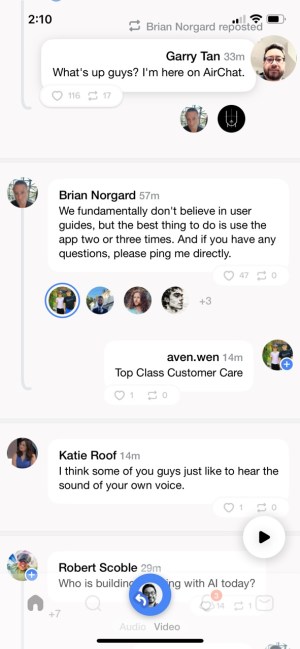Airchat is a new social media app that encourages users to “just talk.”
A previous version of Airchat was released last year, but the team — led by AngelList founder Naval Ravikant and former Tinder product exec Brian Norgard — rebuilt the app and relaunched it on iOS and Android yesterday. Currently invite-only, Airchat is already ranked #27 in social networking on Apple’s App Store.
Visually, Airchat should feel pretty familiar and intuitive, with the ability to follow other users, scroll through a feed of posts, then reply to, like, and share those posts. The difference is that the posts and replies are audio recordings, which the app then transcribes.
When you open Airchat, messages automatically start playing, and you quickly cycle through them by swiping up and down. If you’re so inclined, you can actually pause the audio and just read text; users can also share photos and video. But audio seems to be what everyone’s focused on, and what Ravikant describes as transforming the dynamic compared to text-based social apps.

After joining Airchat this morning, most of the posts I saw were about the app itself, with Ravikant and Norgard answering questions and soliciting feedback.
“Humans are all meant to get along with other humans, it just requires the natural voice,” Ravikant said. “Online text-only media has given us this delusion that people can’t get along, but actually everybody can get along.”
This isn’t the first time tech startups have bet on voice as the next big social media thing. But Airchat’s asynchronous, threaded posts make for a pretty different experience than the live chat rooms that briefly flourished on Clubhouse and Twitter Spaces. Norgard argued that this approach removes the stage fright barrier to participating, because “you can take as many passes at composing a message on here as you like, and nobody knows.”
In fact, he said that in conversations with early users, the team found that “most of the people using AirChat today are very introverted and shy.”
Personally, I haven’t convinced myself to post anything yet. I was more interested in seeing how others were using the app — plus, I have a love-hate relationship with the sound of my voice.
Still, there’s something to be said for hearing Ravikant and Norgard explain their vision, rather than just reading the transcriptions, which can miss nuances of enthusiasm, intonation, etc. And I’m especially curious to see how deadpan jokes and shitposting translate (or don’t) into audio.
I also struggle a bit with the speed. The app defaults to 2x audio playback, which I thought sounded unnatural, particularly if the whole idea is fostering human connection. You can reset the speed by holding down the pause button, but at 1x, I noticed I’d start skimming when listening to longer posts, then I’d usually skip ahead before listening to the full audio. But maybe that’s fine.

Meanwhile, Ravikant’s belief in the power of voice to cut down on acrimony doesn’t necessarily eliminate the need for content moderation features. He said the feed is powered by “some complex rules around hiding spam and trolls and people that you or they may not want to hear from,” but as of publication he hadn’t not responded to a follow-up user question about content moderation.
Asked about monetization — i.e., when we might start seeing ads, audio or otherwise — Ravikant said there’s “no monetization pressure on the company whatsoever.” (He described himself as “not the sole investor” but “a big investor” in the company.)
“I could care less about monetization,” he said. “We’ll run this thing on a shoestring if we have to.”



